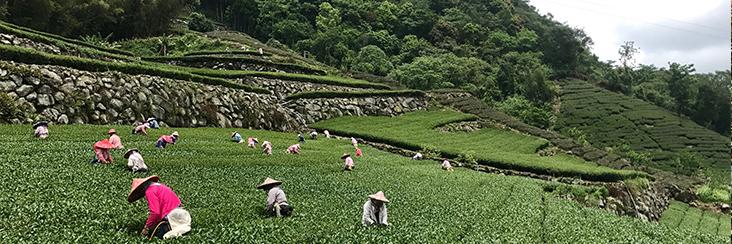
Gold Medal Award Jin Xuan High Mountain Tea | Eco-Cha Tea Club

This month's batch of tea being shared with the Eco-Cha Tea Club is from spring harvest in the village of Zhangshuhu, where some of the highest quality Alishan High Mountain Tea is produced. We have been visiting this remote village for over 15 years, and have watched it become the most esteemed source of High Mountain Tea from this region. Below is the view from the tea garden shown in the above photo.

Our friend who won Gold Medal Awards in this year's Meishan Farmers' Association "New Strain" Spring Tea Competition has been sourcing his competition batches of tea from the most sought after tea makers in this village for many years. The "New Strain" competition for this area represents Jin Xuan, otherwise known as "Tai Cha #12" — the most popular hybrid strain cultivated in Taiwan. The Meishan Farmers' Association is home to the second largest tea competition in Taiwan, following the Lugu Farmers' Association's Dong Ding Oolong Tea Competition — which is the largest Oolong Tea competition in the world.
The quality standard for the Meishan competition calls for a lightly roasted High Mountain Tea character. This is a relatively new flavor profile that stands between an unroasted High Mountain Tea and the more traditional, medium roasted Oolongs. Taiwan's national tea judges set this standard to promote a different style of tea making that has its own specialty quality. The art of roasting is added to the value of expert farming and processing of High Mountain Tea. In order to achieve optimal roasting results, the leaves need to be sufficiently oxidized, but not too much — perhaps 5-10% more than a standard unroasted "green" High Mountain Tea.

The slightly more oxidized leaves are roasted with finesse to produce a balanced, smooth and somewhat sweeter profile than its unroasted High Mountain Tea predecessor. The April batch of the Eco-Cha Tea Club was the Qing Xin Oolong category of the same competition. Now we are able to share a batch of tea that is the same competition standard, but made with Jin Xuan Tea leaves. The difference between the two tea types grown in the same region and processed the same way is subtle, yet noticeable in terms of the innate qualities of these two tea strains. Jin Xuan is known for its sweeter, milder, smoother and more palatable qualities than its Qing Xin "mother-strain". It was designed for optimal range of adaptability in both its cultivation and processing methods. It has become one of the most popular tea types on the international market originating from Taiwan.


